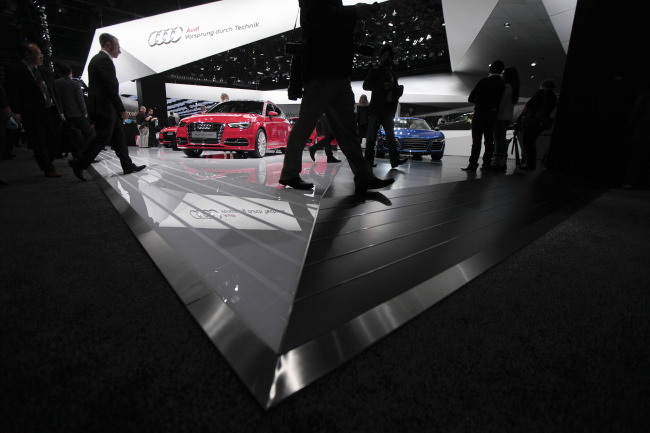BEIJING (AFP) ― More than 1,000 companies in China’s auto sector, both domestic and foreign, are “involved” in anti-monopoly probes by the government, state media reported Wednesday.
The China Daily quoted an official at the National Development and Reform Commission saying that probes into state-owned and Chinese owned private enterprises are also taking place.
In recent months China has launched high-profile probes into alleged wrongdoings by a host of foreign firms in a range of different sectors including pharmaceuticals, technology and baby milk, raising fears that overseas companies are being targeted.
Auto firms are the latest to be investigated, and last week the NDRC pledged to sanction German brand Audi, owned by Volkswagen, and Chrysler of the U.S., now part of Italy’s Fiat group, without stating what penalties they would receive.
 |
Attendees walk past the Audi stand during the 2014 North American International Auto Show in Detroit, Michigan. (Bloomberg) |
On Monday, Audi announced it will accept punishment.
Several car companies have announced price cuts in response to the inquiries.
China’s Ministry of Commerce on Saturday released a statement emphasising that the six-year-old Anti-Monopoly Law does not discriminate between foreign and domestic companies.
The NDRC official, who declined to be named, appeared to stress the same line, telling the China Daily: “Investigations in many industries started with domestic companies and then spread to foreign companies.”
It was not clear how many of these companies were Chinese or foreign, and how many were suspected of wrongdoing.
A monopoly case involving a state-owned company ― not in the auto sector ― would soon be disclosed, he added.
The NDRC is China’s top economic planning agency and is one of the government bodies that polices violations of the country’s Anti-Monopoly Law.
Beijing considers using a dominant market position to set prices as a form of monopoly. Violators’ “illegal gains” can be confiscated, and they can be fined up to 10 percent of their sales revenue in the previous year.
China’s State Administration for Industry and Commerce, which also enforces the anti-monopoly law, is investigating U.S. software giant Microsoft for allegedly operating a monopoly.
Foreign drugs companies including Britain’s GlaxoSmithKline have also been the target of wide-ranging probes.
Global consumer icons Apple and Starbucks are among foreign firms that have received unflattering coverage in state media over service and pricing.








